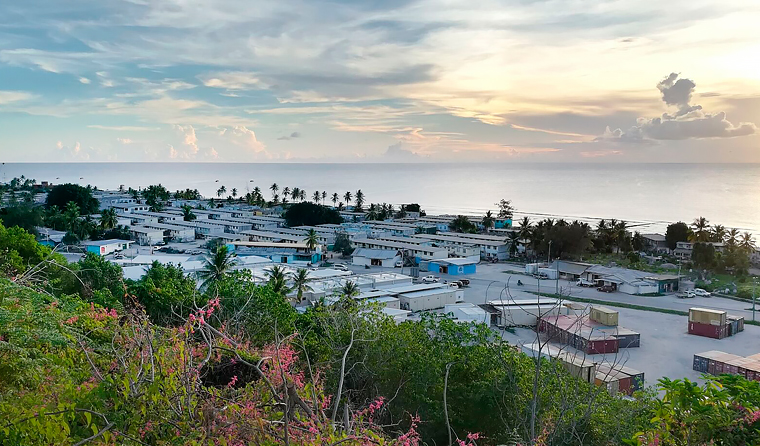News
Advocates applaud court decision on Medevac bill remote assessments
The Coalition Government is unhappy with the court’s decision – but refugee health advocates argue the finding is sensible and humane.
 People held in offshore detention on Nauru often require remote assessment for medical transfer (Image: Jason Oxenham)
People held in offshore detention on Nauru often require remote assessment for medical transfer (Image: Jason Oxenham)
The case was triggered when a 29-year-old Iraqi man, who has been held on Nauru for six years, sought transfer to Australia to treat a major depressive order under the Medevac laws that have been active since March.
When two doctors signed off on the man’s need for transfer after conducting a remote assessment using medical records from the treatment he had received while in detention, the Department of Home Affairs argued this was not adequate basis for such a decision and that patients should instead be examined in person.
‘As I’m advised, not only do they not have to see the patient themselves, the patient doesn’t even need to provide consent,’ Home Affairs Minister Peter Dutton told reporters yesterday.
‘I’m not even aware that some of these people on Manus and Nauru know these advocate doctors are putting forward their cases for consideration.’
However, the Federal Court ruled against the Department of Home Affairs earlier this week, stating that remote assessment is adequate for the purpose of the Medevac laws – and is, in fact, often necessary in the cases of people held in offshore detention.
‘If appropriate personal engagement required a personal consultation with the “treating doctor”, transitory persons who were unconscious or otherwise incapable of attending or participating in any consultation including, for example, by reason of the unavailability of an appropriate interpreter or the unavailability of telecommunications services, would be excluded from access to the Medevac scheme,’ Justice Mordecai Bromberg said.
Dr Kate Walker, Chair of the RACGP Specific Interests Refugee Health network, agrees with the judge’s decision, pointing out that in-person examinations are often not possible in offshore detention, especially in the cases of those held on Nauru.
‘Those refugees and asylum seekers have had difficulty accessing the Medevac legislation because the Nauruan Government has prevented them from having phone or telemedicine access with Australian doctors,’ she told newsGP.
‘Therefore, they are unable to access potential medical evacuation through the legislation unless it’s through written documentation of their medical records, as requested by Australian doctors from the healthcare they’re already receiving in Nauru.’
Dr Walker further observed that remote medical assessment is already standard practice for many cases of patient care within Australia.
‘It’s not always possible to see every single patient with regards to giving an opinion. So we often use the written format for triaging where it is best to send a patient,’ she said.
‘It’s a practical way for patients in Australia to be assessed by specialists prior to them being sent to a particular place for treatment.
‘It’s a really useful tool to review someone’s medical record with documentation from other medical practitioners to decide where best to seek the optimum care for patients.’

People being held on Nauru often cannot be medically assessed in person. (Image: Médecins Sans Frontières)
Minister Dutton has expressed concern that allowing medical transfer under the Medevac bill as it stands will ‘open the floodgates’ to illegal migration and may even ‘restart the boats’, and has announced the possibility of taking the Department’s challenge further.
‘I would be keen to see this appealed to the High Court,’ Minister Dutton said.
‘We already provide medical assistance … but we aren’t going to be forced into a position where two doctors, two random GPs, can sign off not having seen a patient for them to come here.’
But new Shadow Home Affairs Minister Kristina Kenneally has contended the legislation has already proven not to have this effect.
‘[The panel] has already rejected more applications than it has approved, showing that it is working
properly,’ she said.
‘In the past, the Government has made ridiculous claims that hundreds of people would be transferred almost immediately to Australia because of Medevac – that has not happened.’
Dr Walker agrees and highlighted that the Medevac legislation is about ensuring the provision of adequate healthcare for patients under Australian jurisdiction.
‘It’s about our duty of care to people who we have put in these places where there is inadequate medical care to meet their needs, and it’s only for those cases who are unable to be managed in the regional processing centre,’ she said.
‘The legislation is about enabling them to have medical care, it doesn’t allow them to have permanent settlement.
‘It is not about anything else but doctors’ opinions being used to triage the medical needs of people who are unwell and not getting the care they need.’
Asylum seekers Manus Island Medevac Medical transfer Nauru Offshore detention Refugee healthcare refugees Urgent medical transfer bill
newsGP weekly poll
Are you interested in prescribing ADHD medication?